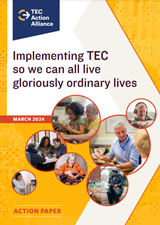Implementing TEC so we can all live gloriously ordinary lives

In an era where technology intertwines with every aspect of our lives, the TEC Action Alliance, supported by our partnership, is proud to spotlight a pivotal report. This groundbreaking research, led by social policy researcher Dr Sarah Alden for the TEC Action Alliance, delves into the heart of what individuals truly seek from digital care services and devices—unveiling the nine fundamental desires that are often overlooked.
With our commitment and that of around 30 more organisations, the TEC Action Alliance places the preferences and needs of individuals, families, and unpaid carers at the forefront of technology-enabled care (TEC) development. This initiative stems from a dedicated study examining over 100 sources and engaging with the community through interviews and focus groups, to capture the genuine expectations from TEC services.
The Nine Pillars of Digital Care
- Awareness: "Enhancing knowledge on how technology can cater to individual needs."
- Independence: "Empowering individuals through devices that augment self-sufficiency."
- Control: "Ensuring personal agency over care technology is maintained."
- Reassurance: "Offering peace of mind through connected and secure technology."
- Seamlessness: "Integrating technology smoothly with existing devices for a unified experience."
- Personalisation: "Tailoring technology to meet unique needs, providing true choice."
- Equal Decision-Making: "Inviting contributions in the design and functionality of care technology."
- Support: "Delivering assistance, advice, and training for seamless technology adoption."
- Privacy and Security: "Guaranteeing data protection and online safety."
A Call to Action
Within the report, the TEC Action Alliance urges local authority social care commissioners and housing providers to reflect these principles in their TEC procurement processes, ensuring a person-centred approach that resonates with the actual needs of the community.
Bridging the Language Gap
The report also highlights the necessity for a unified language that describes TEC, advocating for clear, accessible definitions that simplify digital care for everyone involved—be it individuals, families, or professionals.
Expanding Awareness and Assurance
Identifying an opportunity to reach individuals with lower-level needs not yet on the radar, the TEC Action Alliance recommends that NHS primary care and community services play a crucial role in early signposting to TEC services. This strategic approach aims to foster self-management and delay the escalation of care needs. Furthermore, the report suggests broader adoption of quality assurance schemes, offering confidence in the reliability and safety of TEC solutions.
A Vision for Co-produced, Person-centred Care
Alyson Scurfield, CEO of TEC Services Association (TSA), and co-chair of the TEC Action Alliance, reflects on the mission:
“Over two million people in the UK already use technology enabled care but there is an opportunity to support many more people to live happily and independently at home. We’ll never realise this potential if we don’t ask people what they want from digital care, and then design services and solutions around these ambitions – rather than assuming we know what they want.”
Clenton Farquharson CBE, Chair of Think Local Act Personal (TLAP) and co-chair of the TEC Action Alliance, adds:
“Organisations providing TEC services or manufacturing devices must re-focus on people, their families and unpaid carers. This means co-producing TEC, so it’s shaped by individuals. It also means ensuring TEC is easy to use and seamless, providing support so people feel confident using it. Those basic principles must be followed, right across the sector, so people can live technology-enabled lives.”
Sarah Alden’s research corresponds with the Foundations and Principles that have been captured in the second phase of TAPPI (Technology for our Ageing Population: Panel for Innovation). The TAPPI programme aims to improve the way technology is used in housing and care and is led by the Housing LIN and TSA, and funded by Dunhill Medical Trust.
Find out more here.
